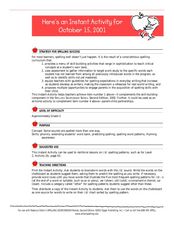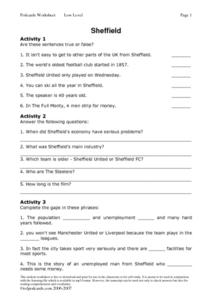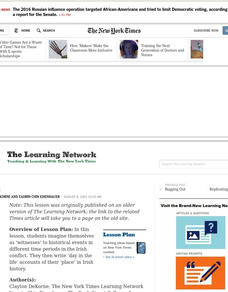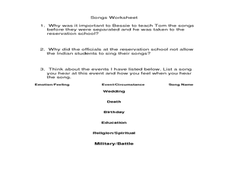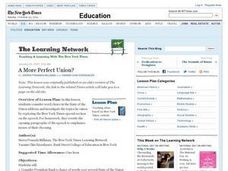Curated OER
Its All In The Delivery
Students investigate the concept of different words and how they are used in specific texts. They develop scripts based upon readings and then design props and costumes to act out the new text. Students read to one another using the...
Curated OER
Geography Booklet
Sixth graders explore geography terms. Students use resources to find real examples of landforms in the world. They create a map showing the landform. students label the surrounding features, countries and states. Students use each...
Curated OER
Phonics: Long O Spelling Patterns
Second graders review the spelling of words with the long O sound. In this phonics lesson, 2nd graders brainstorm words with the long O sound, gain exposure to common long O spelling patterns and sort long O words based upon the spelling...
Curated OER
Dinosaur History (Part 2)
Pupils read the scripture that cooresponds to the lesson. Using the text, they examine the history of the dinosaur and how they were discovered. They ask quesitons and participate in a class discussion to end the lesson.
Novelinks
The Devil’s Arithmetic: Concept Analysis
A helpful guide to Jane Yolen's The Devil's Arithmetic for your literature unit. Use the sections on point-of-view, dramatic irony, and background knowledge, among others, to frame your lessons in an engaging and educational way.
Curated OER
Do the Hokey Pokey in Many Languages
Students replace the body part words in the tune The Hokey Pokey with the same body part words in other languages. They learn the vocabulary more readily because of the connection to music.
Curated OER
Sheffield
In this language arts worksheet, students listen to a podcast about Sheffield, England. They complete a cloze activity while listening. Students label 6 statements as true or false. They answer 5 comprehension questions and complete 4...
Curated OER
Present Simple Verb Form Worksheet
In this present simple verb and occupations worksheet, students fill in 15 blanks using the verbs given in the key. They fill in the missing words and verbs in a paragraph. They match descriptions of occupations with the proper word and...
Curated OER
Know your Daemons
Students take a closer look at Pullman's The Golden Compass. In this current events lesson, students visit the film's interactive website and participate in a discussion about the nature of religion in the book and the film.
Curated OER
Vocabulary and Language Development
Learners discover new vocabulary words. In this language development lesson, students reach into a box of themed items and identify the object. They discuss the attributes of the object as well.
Curated OER
Marching On
Students explore the increasingly diverse civil rights movement by researching and profiling its key issues, main organizations, and top leaders.(August 25, 2003)
Curated OER
One Nation - Many Voices
Students examine art from various cultural backgrounds across Canada. They examine and analyze artworks illustrating various cultural groups. They explore the diverse nature of their community. They construct a visual map of their...
Curated OER
French and Indian War: Make A Map
Fifth graders create a map of the battles that occurred during The French and Indian War. In this history lesson plan, 5th graders read about the war in their text books, then divide into groups to create a detailed map of a famous...
Curated OER
Faces Behind the Guns
Young scholars use the New York Times article profiling ordinary citizens who legally own guns as the basis of a role-playing exercise in which they explore the types of people who own firearms and their personal reasons for doing so.
Curated OER
Ire Land
Students imagine themselves as 'witnesses' to historical events in different time periods in the Irish conflict. They write 'day in the life' accounts of their 'place' in Irish history.
Curated OER
Songs of Native Americans
Students listen to chapter from novel When Legends Die by Hal Borland, listen to traditional Lakota song, discuss feeling song induces and in what circumstance it may be used, and examine connection between cultural music and family...
Curated OER
A More Perfect Union?
Students read and discuss the article "Bush Insists U.S. Must Not Fail in Iraq." They work in small groups to answer three questions based on their category by searching for the answers in the article read in class.
Curated OER
A Historic Gamble
Young scholars explore and evaluate the economic impact of legalized gambling on Native American Indian communities. They draft short, persuasive speeches that take the perspective of a tribal elder appearing at a town council meeting.
Curated OER
Modern Conditions Placed on Traditions
Students explore the role of traditions in world cultures. They read a New York Times article dealing with recent changes in the traditional clothing worn in England's House of Lords
Curated OER
Explosive Knowledge
Learners examine China's suspected theft of American nuclear secrets, as a springboard for the creation of a research-based, multi-tiered timeline that traces the development, regulation, and use of nuclear weapons from the 1940's to today.
Curated OER
Fighting for Fair Farming
Students consider various economic terms, examine the impact of subsidies on farmers and other industries, write essays explaining the subsidy process, and illustrate through posters how subsidies affect both domestic and foreign markets.
Curated OER
Rhythm Nation
Learners read a New York Times article to help them develop an understanding of the history, development, and social influence of various types of world music through the creation of music museum exhibits.
Curated OER
A Tale of Two Wars
Young scholars create Venn diagrams comparing and contrasting the Vietnam and Iraq wars. They write informed letters to their senators expressing their opinions and possible solutions to the war. They also create mock bumper stickers...
Curated OER
What is Justice?
Eighth graders discuss justice and fairness. In this equitable treatment of others lesson plan, 8th graders say the Pledge of Allegiance and read a passage from a blog. Students discuss the terms: fair, just, and equitable.




